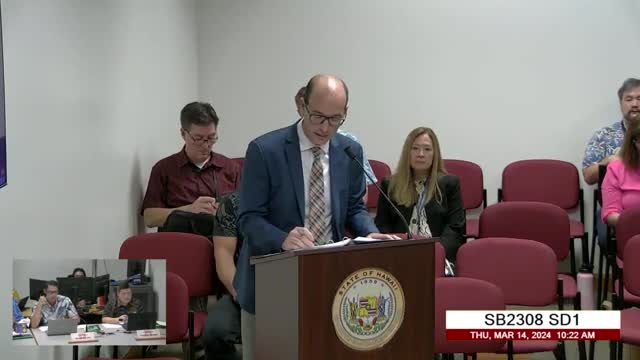Hearing discusses mandatory traffic fines and their impact on low-income drivers
July 13, 2025 | House Committee on Transportation, House of Representatives, Legislative , Hawaii
This article was created by AI summarizing key points discussed. AI makes mistakes, so for full details and context, please refer to the video of the full meeting. Please report any errors so we can fix them. Report an error »

The TRN Public Hearing held on March 14, 2024, focused on proposed changes to traffic law penalties and the implications of mandatory fines for speeding violations, particularly in school zones. The meeting began with discussions surrounding the effectiveness of increasing fines as a deterrent for speeding.
A key point raised was the concern that higher fines disproportionately affect low-income drivers, who may struggle to pay these penalties. One participant highlighted that while the intention behind increasing fines is to enhance safety, it could lead to a cycle of court debt for those unable to afford the fines. This concern was echoed by the public defender, who noted that mandatory fines remove judicial discretion, potentially exacerbating issues for financially disadvantaged individuals.
The discussion also touched on a 2022 study referenced during the meeting, which examined the quality of driving among different income groups. Some lawmakers questioned the study's implications, suggesting that poor driving behavior might stem from inadequate laws rather than financial status. The public defender clarified that while financial ability plays a role in compliance with fines, it does not necessarily correlate with driving behavior.
As the conversation progressed, lawmakers expressed the need to balance public safety with the realities faced by low-income drivers. The public defender emphasized that mandatory fines could lead to overcrowded court systems and further complications for those unable to pay.
The meeting concluded with a shift to the next agenda item, which involved proposed changes to existing penalties for traffic law violations and adjustments to motor vehicle insurance minimums. The director of the Department of Transportation was set to provide testimony in support of these changes.
Overall, the hearing underscored the complexities of traffic law enforcement, particularly the need to consider the financial implications of penalties on vulnerable populations while striving to maintain public safety.
A key point raised was the concern that higher fines disproportionately affect low-income drivers, who may struggle to pay these penalties. One participant highlighted that while the intention behind increasing fines is to enhance safety, it could lead to a cycle of court debt for those unable to afford the fines. This concern was echoed by the public defender, who noted that mandatory fines remove judicial discretion, potentially exacerbating issues for financially disadvantaged individuals.
The discussion also touched on a 2022 study referenced during the meeting, which examined the quality of driving among different income groups. Some lawmakers questioned the study's implications, suggesting that poor driving behavior might stem from inadequate laws rather than financial status. The public defender clarified that while financial ability plays a role in compliance with fines, it does not necessarily correlate with driving behavior.
As the conversation progressed, lawmakers expressed the need to balance public safety with the realities faced by low-income drivers. The public defender emphasized that mandatory fines could lead to overcrowded court systems and further complications for those unable to pay.
The meeting concluded with a shift to the next agenda item, which involved proposed changes to existing penalties for traffic law violations and adjustments to motor vehicle insurance minimums. The director of the Department of Transportation was set to provide testimony in support of these changes.
Overall, the hearing underscored the complexities of traffic law enforcement, particularly the need to consider the financial implications of penalties on vulnerable populations while striving to maintain public safety.
View full meeting
This article is based on a recent meeting—watch the full video and explore the complete transcript for deeper insights into the discussion.
View full meeting
